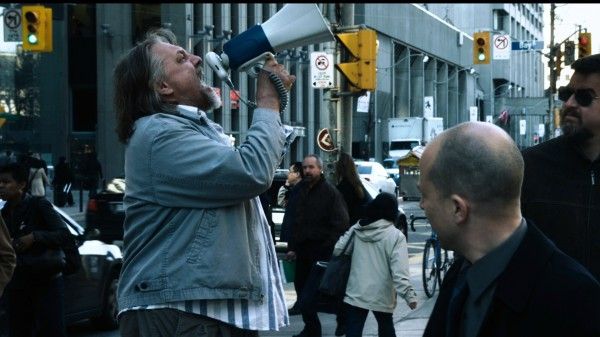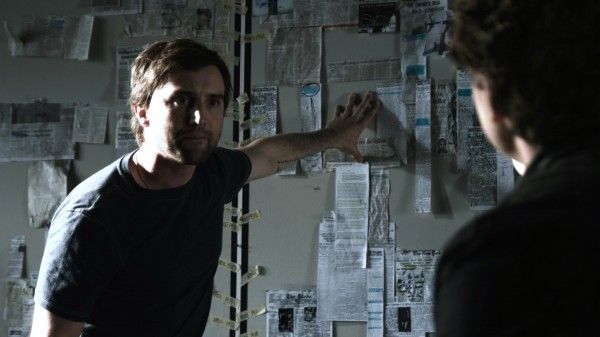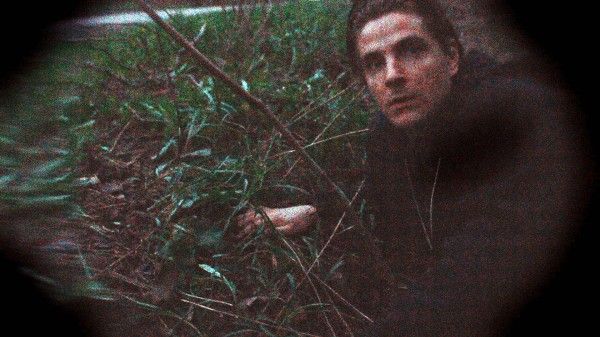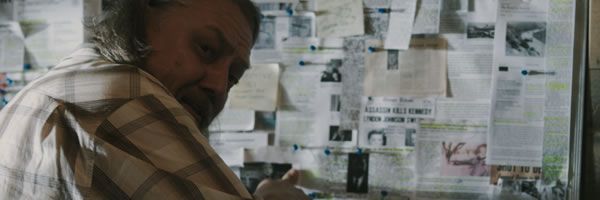Conspiracies are a fascinating culture phenomenon, and The Conspiracy has no interest in that. In fact, writer-director Christopher MacBride has no interest in probing deeper into the nature of conspiracies, and instead turns his attention to churning out the most generic, tired conspiracy yarn possible. Then, in an obvious gimmick, he couches his weak story inside the framing device of a faux-documentary. There's no attempt to play off other loony-bin documentaries like Loose Change, or any trace of a serious effort to keep us guessing to the authenticity of the documentary form. Until a horribly clumsy ending, everything in The Conspiracy is at face value: the one-dimensional characters, the thoughtless clichés, and the total lack of insight about why conspiracies are interesting in the first place.Aaron (Aaron Poole) and Jim (James Gilbert) are documentary filmmakers who decide to make a film about Terrance G. (Alan C. Peterson), a local conspiracy theorist who takes to the streets and shouts his theories through a megaphone. Before we can get any sense of Terrance's character beyond his profession, he mysteriously disappears, but there are still scraps of the countless news clippings he had on his wall.  Aaron picks up the pieces, and tries to follow Terrance's work, although Jim thinks his friend is starting to go round the bend (it's tough to tell since we hardly know Aaron well enough to see any kind of radical transformation). However, Aaron eventually connects the dots to the nefarious organization, The Taurus Club, who are looking to create a "New World Order". MacBride could have picked his conspiracy out of a hat for the entire lack of creativity and imagination behind his choice. There's no reason that aliens or the government couldn't be the antagonist. But seemingly at random, it's an Illuminati-like group who want to impose the New World Order, which means one nation where power rests in the hands of a secret oligarchy. The logistics of this is never explored, and MacBride only wants us to play along insofar that we don't scoff at the notion of a far-reaching conspiracy. We're just not allowed to ask too many questions either.For example, we don't get to ask why an all-powerful organization would leave so many of their thumbprints behind in the news clippings put together by Terrance. Why would the Taurus Club not make it a priority to control every single major media outlet? Also, how did this become the only powerful organization? I guess the protagonists getting caught between two conspiracies would have been too much of a curveball in this tee-ball league of a picture. Instead, we get one secret society using an old standby such as a black SUV, the conspicuous vehicle of choice for all shady organizations.
MacBride could have picked his conspiracy out of a hat for the entire lack of creativity and imagination behind his choice. There's no reason that aliens or the government couldn't be the antagonist. But seemingly at random, it's an Illuminati-like group who want to impose the New World Order, which means one nation where power rests in the hands of a secret oligarchy. The logistics of this is never explored, and MacBride only wants us to play along insofar that we don't scoff at the notion of a far-reaching conspiracy. We're just not allowed to ask too many questions either.For example, we don't get to ask why an all-powerful organization would leave so many of their thumbprints behind in the news clippings put together by Terrance. Why would the Taurus Club not make it a priority to control every single major media outlet? Also, how did this become the only powerful organization? I guess the protagonists getting caught between two conspiracies would have been too much of a curveball in this tee-ball league of a picture. Instead, we get one secret society using an old standby such as a black SUV, the conspicuous vehicle of choice for all shady organizations. These niggling questions wouldn't be so much of a problem if MacBride didn't put all of his energy into such a tepid, tired plot. The thoughtlessness of the story could be somewhat forgiven if the thought was directed towards exploring why people believe in conspiracies in the first place. MacBride doesn't hesitate to repeatedly show clips of the JFK assassination and 9/11, but he never asks why people build conspiracies around these events. The filmmaker doesn't acknowledge that these conspiracies develop because theorists need to have faith in something larger than horrible events. If there's a Taurus Club out there, then at least we don't live in a random, unforgiving universe. Theorists like Terrance can whine all they want about a New World Order, but "order" is what they crave.MacBride could not care less. He only seems to care about his lazy faux-documentary approach. The framing device is nothing but a cheap cloak to shroud the plot's lack of originality. There's no cleverness on behalf of MacBride when it comes to tweaking the formula, and we certainly don't get a better understanding of the lead characters simply because they're shooting each other with cameras. By the end of the film, I still had trouble remembering which actor was Aaron and which actor was Jim because their characters lack distinction. Jim is vaguely the voice of reason, but never to the point where he forcefully confronts Aaron or leaves any serious impact on the storyline. They're both just being carried away by the silliness of an unimaginative plot.
These niggling questions wouldn't be so much of a problem if MacBride didn't put all of his energy into such a tepid, tired plot. The thoughtlessness of the story could be somewhat forgiven if the thought was directed towards exploring why people believe in conspiracies in the first place. MacBride doesn't hesitate to repeatedly show clips of the JFK assassination and 9/11, but he never asks why people build conspiracies around these events. The filmmaker doesn't acknowledge that these conspiracies develop because theorists need to have faith in something larger than horrible events. If there's a Taurus Club out there, then at least we don't live in a random, unforgiving universe. Theorists like Terrance can whine all they want about a New World Order, but "order" is what they crave.MacBride could not care less. He only seems to care about his lazy faux-documentary approach. The framing device is nothing but a cheap cloak to shroud the plot's lack of originality. There's no cleverness on behalf of MacBride when it comes to tweaking the formula, and we certainly don't get a better understanding of the lead characters simply because they're shooting each other with cameras. By the end of the film, I still had trouble remembering which actor was Aaron and which actor was Jim because their characters lack distinction. Jim is vaguely the voice of reason, but never to the point where he forcefully confronts Aaron or leaves any serious impact on the storyline. They're both just being carried away by the silliness of an unimaginative plot. The only remarkable thing about The Conspiracy is how wrapped up it becomes in its banal plotline and uninspired storytelling device. Whether you believe in conspiracies or not, they have the potential to be fascinating stories where a moment of fear and confusion blossoms into a sanctuary of horrifying possibilities. There's nothing horrific or original about The Conspiracy. It doesn't even deserve the definite article. It's A conspiracy, and a pretty lame one at that.Rating: FFor all of our Fantastic Fest coverage, click here. Here are links to my other reviews:
The only remarkable thing about The Conspiracy is how wrapped up it becomes in its banal plotline and uninspired storytelling device. Whether you believe in conspiracies or not, they have the potential to be fascinating stories where a moment of fear and confusion blossoms into a sanctuary of horrifying possibilities. There's nothing horrific or original about The Conspiracy. It doesn't even deserve the definite article. It's A conspiracy, and a pretty lame one at that.Rating: FFor all of our Fantastic Fest coverage, click here. Here are links to my other reviews:

